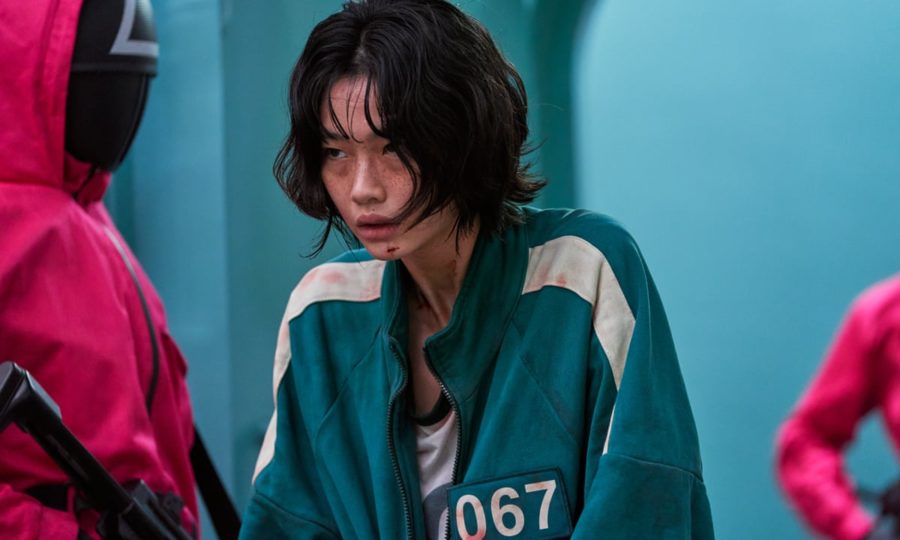“Squid Game” Review
Reminiscent of the Hunger Games, Korean Netflix series brilliantly combines exhilarating thriller with meaningful commentary on human nature
The new K-Drama TV show, Squid Game, has taken the world by storm. It feels like bits and pieces of the show are popular everywhere, from dalgona tutorials on TikTok to dramatic edits on my Instagram explore page. After hearing my friends rave about it for a week, I knew I had to check it out.
If you’ve somehow been spared from the endless social media endorsements, the plot is vaguely Hunger Games-esque, whereby a select group of people compete in to-the-death games for a huge sum of money. The setting, although not dystopic, has similarities to the cinematography of Black Mirror. The horrific dark beauty of normal life serves the purpose of the show well because of its societal critique. If the setting had taken place in the future, it wouldn’t feel as real to audiences.
The main character, Gi-Hun, is millions of won (Korean currency) in debt and trying to form a better relationship with his daughter when he encounters a strange man who gives him the opportunity to get money from playing a childrens’ game ddakji. The man inducts Gi-Hun into a series of six trials, where 456 people compete to win prize money, run by a mysterious “Front Man” and created by “The Host.” Most of them are complete strangers to each other brought together by their copious amounts of debt.
Supporting characters like Gi-Hun’s childhood friend Sang Woo, a thief named Ali, the pickpocket Sae-byeok and an old man with a brain tumor named Oh Il-nam are loveable and bring much-needed depth to the show.
The competitors are left surprised (and some dead) when it becomes apparent that not only do the trials consist of children’s games like Red Light, Green Light and tug of war, but the cost of losing is death. The Front Man even brings VIPs (disgustingly rich Western men) to bet on the outcome of the games as if the lower-class people are nothing but horses in a race.
At its core, “Squid Game” is a fun watch. The gore, drama and complex characters hook you in from the beginning and make bingeing effortless. I easily attached to my favorite characters, and even the antagonists were well rounded, whether they were vicious killers among the players or the immoral runners of the game.
The acting from all the leads was amazing. I never felt like I was watching actors playing parts, except for the English-speaking VIP scenes, which is my only qualm with the show. The dialogue for most of the English definitely could have been written better. I watched the show in Korean with English subtitles, but when I tried to listen to the English dubbing, the voice acting was badly cast and dull. Some fans took to Twitter to say that they believed the Squid Game English dubbing to be better than they expected, but most complained that the dubbed character voices didn’t match their on-screen personas at all. Because of this, I definitely recommend watching the show in Korean with the English subtitles for the entire experience.
Not only were the screenwriters talented in writing the characters, but the clear social commentary on the monetary greed of humankind and the exploitation of the poor by the upper class is smart and disguised well within the context of the show. All the elements hint to corrupt capitalism, like the Host explaining to Gi-Hun that he created the games out of boredom from his monotonous life and the faceless red guards, who are completely unsympathetic to the players’ plights.
Additional elements like the guards who purposely give out less food to encourage fighting and death in between games and the VIPs who sexually exploit their servants (even if they know it will result in their execution) are brilliantly written. Rather than shoved into the audience’s faces, the message of the work is encrypted in tiny details that are both sadistic when seen individually and add to a higher understanding when put together.
I highly recommend Squid Game to anyone who enjoys short and gory dramas or is a fan of The Hunger Games. It’s easy to watch and enjoy without a critical eye, but if you’re prone to analyzing media, there are plenty of scenes that can be broken down for hidden commentary on human nature and references to political and social struggles in the real world.

Notable Life Achievements: Awesome blueberry muffin maker. Can read a Sally Rooney book without throwing up. Has seen Before Sunrise upwards of 10 times. Lighting designed High School Musical 2 in less...



